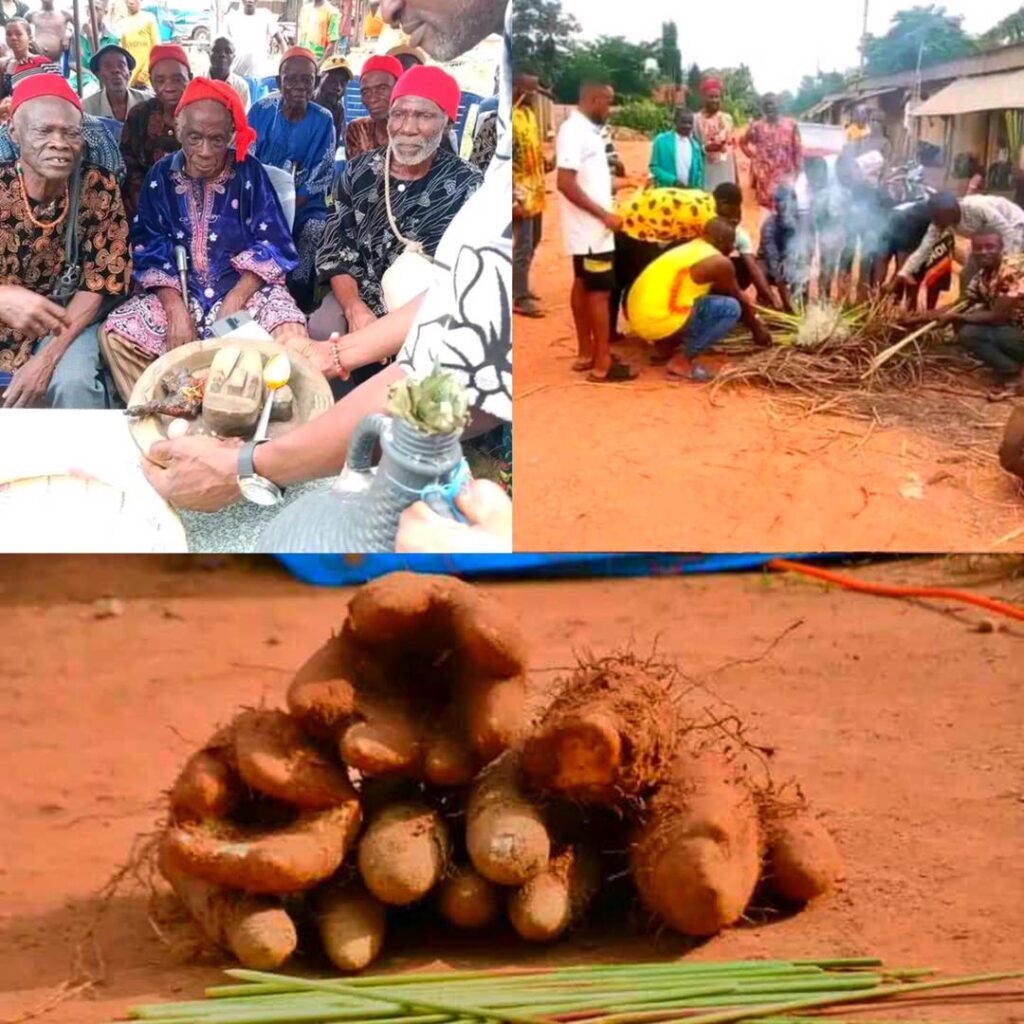INSIDE EBONYI
Itsukwe New Yam Festival, a True Cultural Spectacle

At a time, core values and ethics ruled the world, observation of cultures was held in high esteem with strict compliance laced with the fun associated with it, and consultation of deities to solve pertinent issues was also taken seriously; hatred, disaffection, and unnecessary war were alien. Marriage was based on family background and character, oath taking was an instrument to prove one’s innocence, unwanted pregnancy, indecent dressing, smoking, harlotry, and infidelity were taboo.
Diseases were treated with the backs of trees, leaves, or roots of plants, and death was not common. Above all, we paid utmost attention to our cultural heritage as It was a compass that guided us until the advent of Christianity which made many turn away from our cultural practices, believing so to be contrary to their faith.
Ngboejeogu from ancient times is widely known as a nation that has much value for its culture and traditions. Despite Western cultural imperialism which suppressed some cultural practices adjudged to be obsolete with time, Ngboejeogu New Year/Yam Festival, otherwise known as Itsukwe remains an outstanding and resilient celebration, resistance to external influences, and is celebrated with vigor in the Ngbo Nation.
This is perhaps a result of the great importance attached to yam, the king of crops in Ngboejeogu, and the beginning of a new calendar year in Ngbo. The date for the Itsukwe feast which was formerly called JI-OHA is been fixed by Ndu Anmegu in Umuezeaka Ngbo who are traditionally vested with the power to make announcements and fix a date for feasts in Ngbo.
However, New Yam/ New Year is celebrated in almost all Igbo Lands, though in different patterns, months, and seasons. The people of Ezzakuna call it Oke-aku, while Izhi call it Ojiji, but in Ngbo, it is called Itsukwe. The word, Itsuikwe is derived from two words with literary meanings: “Itsu” means, to pound, while “Ikwe” means Morta.
Itsukwe festival is celebrated annually in the ninth month of the Ngbo calendar, which usually falls between July and August on the fourth Ekoshi market day of the month. It is celebrated to mark the end of food scarcity and to announce the beginning of food abundance in Ngbo. The festival is usually a historic event in the annals of the Ngboejeogu Nation because of the glamour and fun associated with it. Itsukwe festival is heralded by the appearance of a significant moon which is called “Onwa Itsukwe”.
Children always make loud excitement at night whenever the moon is sighted. As a celebration of a populous Nation known for its outstanding farming skills, especially in yam crops, the Itsukwe festival enthrones a healthy competition among men, on who would produce the best new tuber of yam for the year, both in size and quantity. In Ngbo, there are three types of yam with different varieties: White yam, Yellow yam (Ogomodu), and water yam (Mbala). Among the white yams, Obela and Opoke are the best for making pounded yams (Utara Ji).
As this year’s Itsukwe festival will be held today Sunday 28th July 2024 (Fourth Ekoshi), It is expected that all the sons and daughters of Ngboejeogu both at home and in the diaspora will return home to partake in the fun-filled festival as culture demands. In-laws, friends, well-wishers, and admirers of Ngboejeogu Nation from all walks of life are also expected to come and share in the joy of the celebration.
Accordingly, the Itsukwe New Yam Festival is accompanied by a protocol of lined-up activities and preparations to make it attractive and memorable. Those lined-up activities marking the feast usually commence with the tradition driving away of illnesses in Ngbo. (ichi oria).
On Okwo Market Day, 3 days before the feast, people are expected to buy items that will be used for the celebration. On the proceeding day, Azu-okwo market day, two days before the festival is designated as a thorough clean-up exercise in all compounds and paths leading to multifarious villages, while women scrub their houses with cow dung. Children on their part, gather in their numbers to knock the elephant grass called “Ekperima” been smoked on firewood or dried palm frond.
All these are geared towards welcoming the new yam, the chief crop of Ngbo land. Unugwe market day, a day before the feast is “Nfioji Day.” On this day, both Bachelors and married men who are yet to wed officially, harvest their new yam for the feast.
On the night of Unugwe, Children keep night vigil with the use of Ekperima (Elephant grass) whose sound is akin to the gun, among other activities marking the feast. The climax of the Itsukwe festival therefore is held in grand style on Ekoshi market day following a declaration by the elders of Okposhi Nkwolu who are saddled with the responsibility of performing a ritual called “Sacrificial eating of yam and pounding of empty mortar”.
Indeed, the Ituskwe festival is momentous in the life of an average Ngbo man irrespective of sociopolitical and religious background. Ngbo people attach more value to yam and that is why yam peels are not poured into the compound nor broom used to pack it. As culture demands, anyone who marches his or her foot on yam in Ngbo must embrace the yam immediately to appease it.
It is important to note that yams are not harvested in Ngboejeogu before the Itsukwe festival. Such early harvest if found is viewed as a breach of tradition and the person involved is regarded as a poor man. The amount of yams one has in the farm or barn determines how industrious one is. At this period of festivity, people would invite their in-laws, friends, and well-wishers to celebrate the feast with them. The festival offers women the golden opportunity to encourage and give praises to their husbands for their industriousness in the season.
The significance of the Itsukwe New Yam Festival in Ngbo land cannot be overemphasized: It is a period where all the kindreds settle their differences and embrace one another to propel development and engender peaceful coexistence and harmonious relationships. Kindred units also use the period to determine their population and as well allow all the men to choose where to plant yam in the next farming season.
The festival promotes unity and peaceful coexistence among (10)Ten autonomous communities that make up Ngbo Nation. It is a period for the exchange of gift items with friends, relatives, and well-wishers. More so, the Itsukwe festival encourages a sense of cooperation among children as they go in unison to gather Ekperima in the bush, knock it together with folk songs, and go for Itsukwe Night coral (Nmbia Ahuu) without altercation. It is pertinent to note that the festival discourages social vices like cultism, stealing, rape, witchcraft, use of masquerade to molest people, among others.
Additionally, Itsukwe is a period where those who did the second funeral ceremony of their parents slaughtered ram to Chukwoke gods ( Barn gods) to give their loved one a full-fledged burial rite in line with Ngbo tradition. Delicacies like: Pounded yam, meat, melon soup (Ohve Ahuu), Palm wine, and porridge yam are been enjoyed by friends, in-laws, and well-wishers during the feast.
Furthermore, it is momentous to note that yams are not sold in any market across the ten autonomous communities in Ngboejeogu (Akpa Ngbo Iyri) until after the Itsukwe festival. Pronouncement and ceremonial sales of yam in the market have been done and performed at Obodo Anmaubwi by the Okposhi Eshi Community.
As the 2023 Itsukwe New Yam Festival will be celebrated with a funfair today, the 28th of July 2024 being Ekoshi market day, it’s another opportunity for all the sons and daughters of Ngbo Nation irrespective of belief or political affiliation to come together, eschew all divisive tendencies and unite in love for optimum development and
growth.
As we invite all and sundry, especially our in-laws and friends for this year’s Itsukwe festival, it is our pride to sing with joy, the song of abundance and Thanksgiving to God: Ngboejeogu: Efo Tsa mputu le nyri abia oo!
-

 CAMPUS REPORTS2 days ago
CAMPUS REPORTS2 days agoKwara Govt Provides Free Transportation, Ease Financial Burden On University Students.
-

 EDITORIAL1 day ago
EDITORIAL1 day agoReno’s Reversal : How A Vocal Critics Became a Tinubu Cheerleader
-

 CAMPUS REPORTS1 day ago
CAMPUS REPORTS1 day agoZulum Renames Borno State University After Kashim Ibrahim
-

 NEWS2 days ago
NEWS2 days agoWike Celebrates Son’s LLM Graduation at Queen Mary University





